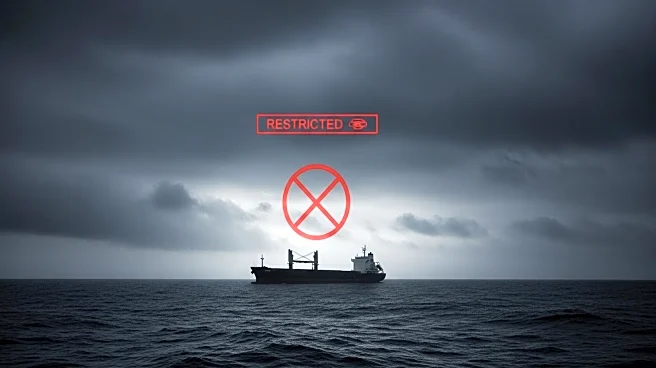What's Happening?
The U.S. Treasury Department has imposed sanctions on a network of shipping companies and vessels led by an Iraqi-Kittitian businessman. This network has been accused of smuggling Iranian oil disguised as Iraqi oil. The businessman, who holds citizenship in Iraq and St. Kitts & Nevis and operates from the United Arab Emirates, allegedly blends Iranian oil with Iraqi oil to circumvent U.S. sanctions. The Treasury's action is part of ongoing efforts to pressure Iran, especially as nuclear negotiations remain stalled. The sanctioned entities include Babylon Navigation DMCC, a UAE-based company, and several Liberia-flagged tankers such as the Adena, Liliana, and Camilla. These tankers are said to facilitate the blending of oils through ship-to-ship transfers in the Arabian Gulf and Iraqi ports. Additionally, several Marshall Islands-based companies have been designated for their roles in obscuring the businessman's ownership of the vessels.
Why It's Important?
This move by the U.S. Treasury underscores the continued tension between the United States and Iran, particularly concerning Iran's oil revenue, which is a significant source of funding for the Iranian regime. By targeting this revenue stream, the U.S. aims to weaken Iran's capacity to engage in activities perceived as threats to U.S. interests and its allies. The sanctions also highlight the complexities of international oil trade and the lengths to which entities may go to evade sanctions. This action could have broader implications for global oil markets, potentially affecting oil prices and international relations, especially among countries involved in the oil trade.
What's Next?
The sanctions are likely to strain relations further between the U.S. and Iran, potentially impacting future negotiations on nuclear and missile issues. The targeted companies and vessels may face operational challenges, and other entities involved in similar activities might reassess their strategies to avoid U.S. sanctions. The international community, particularly countries with vested interests in Middle Eastern oil, will be closely monitoring the situation for any shifts in oil supply dynamics.









